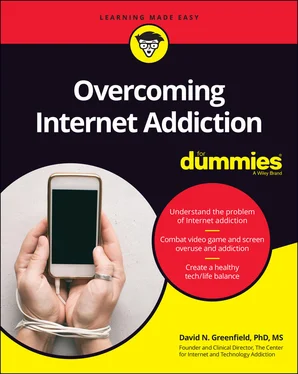Video games incorporate some very attractive factors that contribute to their addictive potential:
They provide stimulating content that is novel, interactive, and dynamic. Games are always evolving, through updates and modifications, to keep the novelty and challenge factor high.
When playing a video game, you can experience a level of growing mastery that often creates a sense of accomplishment; you might develop greater efficacy in your skills and a higher ranking in comparison to other users.
The game provides a sophisticated variable ratio reinforcement and reward structure (the maybe factor), and this structure is modified and changed to maintain user interest and to maximize the dopamine/pleasure response.
All forms of Internet communication facilitate some degree of social connection and group interaction, albeit in a two-dimensional online format, but many video game users find the social component of video gaming to be quite compelling. Many times, gamers are communicating verbally (on a headset) via apps such as Discord or others, and the conversations may not only be about the game being played. Flip to Chapter 7for more about video games.
Although online gambling is technically illegal in the United States, many sites can be accessed offshore and also found on the dark web (covered later in this chapter). The problem with gambling is that it is potentially quite addictive to begin with, but when you combine this stimulating form of content with an online interface, it becomes even more appealing. Online, there are no thresholds to cross and no one to look in the eye; all you have is unfettered, easily accessible content that is both fun and highly addictive. Online gambling removes the last vestiges of human interaction from the equation in that it’s an easy pick-and-click activity with no personal interaction. See Chapter 8for more information.
Shopping can certainly be addictive, and it can elevate your dopamine levels in the same way that many substances and behaviors do. However, what could possibly be bad about the amazing convenience of shopping online? I do it several times a week and it certainly makes my life much easier.
But the dark side to this convenience is that you’re divorced from the impact of your shopping by the ease of being able to search and click and then receive the item within a day or two. Amazon has this down to a science, and they know that the average consumer will almost always purchase more than they ordinarily would because of that ease of access and convenience — and by the fact that they bombard you with reminders and images of what you looked at and what you might need or should buy, you’re pushed to click some more. This consumer science has the effect of making you less conscious of your purchases, at least until the bill comes. Rarely a month goes by that I am not surprised by how much I have spent at Amazon. Sometimes online shopping can just be a little too easy. Chapter 8has more details about online shopping.
Stock trading and online investing are a perfect match for the Internet. Just like shopping (see the previous section), it allows you ease, convenience, and relative privacy, and it makes trading stocks and other investments simple and near instantaneous.
The problem is that sometimes you need time to think about your investments, and you can easily make an impulsive move online. There is a tendency with all online transactions to end up in a pick-and-click pattern that feels good in the moment but may not always be the best choice. Granted, you can make bad investments offline as well — but again, when you are online, there is no threshold to cross, no one to easily call and speak with on the phone, and no one to run things by. Sometimes all that is fine, and if online stock trading is the end point of a well-researched and thought-out choice, then it can work. But as with online shopping, it is just you and your screen, so there is some potential for higher risk in an online transaction.
Our research shows that users tend to be more uninhibited and impulsive online than with other modalities. When you are online, you are in essence isolated and more apt to make riskier decisions. The addictive component is also important to note here in that each time you buy a stock or make an online trade, you’re getting a small hit of dopamine. This occurs irrespective of whether that investment is a good one or not and therefore may be misleading in terms of your judgment. See Chapter 8for more about online investing.
Online sex and pornography
No discussion of online addiction would be complete without a discussion of pornography. In terms of reasons for people seeking treatment and general complaints about Internet addiction, it is on the top of the list along with video gaming.
In some sense, the pornography and adult entertainment industry contributed to the early development and adoption of the Internet. The porn industry spearheaded some of the first examples of using the Internet to provide online adult entertainment to users and was an early example of effective e-commerce. The ease of access, disinhibition, dissociation, privacy, and perceived anonymity of the Internet makes it a near-perfect medium for pornography, and the fact that there are no boundaries and endless choices further facilitates the potential for addictive use. Of those who use online porn, most report overusing it at times, and a sizable percentage feel addicted to it at least part of the time.
Many other sexual behaviors are also available online that can become addictive, including visiting webcam sites, watching private video shows, engaging in video/phone sex, and websites featuring various form of real-time sex work. In addition, there are numerous hook-up and sex sites that use an online platform to connect buyers and sellers of these services, as well as prostitution. Again, many of these activities existed prior to the Internet, but the Internet is a clear amplifier and facilitator, and makes the use and abuse of these behaviors all too easy. When it comes to sex, you have a double hit in that sex is one of the primary reward drives in the brain, and along with the addictive medium of the Internet, there can be an amplification of the addictive risk potential.
 The dark web is an offshoot of the Internet and can offer many things (legal and illegal) that cannot be found on the normal Internet browsers such as Google Chrome, Safari, Firefox, and Microsoft Edge. A plethora of illegal pornography, drugs, and other illicit merchandise and services are available on the dark web, but there are also monitors in place where you can be caught accessing this illegal information or merchandise. Anything and everything is available on the dark web, and it remains the true Wild West of the Internet (and you do not know whom you are dealing with). My general advice is to avoid its use, and if you have any issue with addiction to substances or online pornography, this can be a dangerous place. The dark web does not have some of the online checks and balances (as limited as they are) that normal browsers afford.
The dark web is an offshoot of the Internet and can offer many things (legal and illegal) that cannot be found on the normal Internet browsers such as Google Chrome, Safari, Firefox, and Microsoft Edge. A plethora of illegal pornography, drugs, and other illicit merchandise and services are available on the dark web, but there are also monitors in place where you can be caught accessing this illegal information or merchandise. Anything and everything is available on the dark web, and it remains the true Wild West of the Internet (and you do not know whom you are dealing with). My general advice is to avoid its use, and if you have any issue with addiction to substances or online pornography, this can be a dangerous place. The dark web does not have some of the online checks and balances (as limited as they are) that normal browsers afford.
Identifying the Signs and Symptoms of Internet and Screen Addiction
Following is a general list of things to look out for to determine whether you may be suffering from an addiction to the Internet. Sometimes just developing an awareness of what you’re doing can increase your self-consciousness enough to cause you to change your habits and patterns. This is a good place to start. Generally, small changes can be valuable, but you can make those changes only if you are really aware of what you’re doing. Chapter 10has more information on identifying signs and symptoms, and Chapter 11provides a number of self-assessments.
Читать дальше

 The dark web is an offshoot of the Internet and can offer many things (legal and illegal) that cannot be found on the normal Internet browsers such as Google Chrome, Safari, Firefox, and Microsoft Edge. A plethora of illegal pornography, drugs, and other illicit merchandise and services are available on the dark web, but there are also monitors in place where you can be caught accessing this illegal information or merchandise. Anything and everything is available on the dark web, and it remains the true Wild West of the Internet (and you do not know whom you are dealing with). My general advice is to avoid its use, and if you have any issue with addiction to substances or online pornography, this can be a dangerous place. The dark web does not have some of the online checks and balances (as limited as they are) that normal browsers afford.
The dark web is an offshoot of the Internet and can offer many things (legal and illegal) that cannot be found on the normal Internet browsers such as Google Chrome, Safari, Firefox, and Microsoft Edge. A plethora of illegal pornography, drugs, and other illicit merchandise and services are available on the dark web, but there are also monitors in place where you can be caught accessing this illegal information or merchandise. Anything and everything is available on the dark web, and it remains the true Wild West of the Internet (and you do not know whom you are dealing with). My general advice is to avoid its use, and if you have any issue with addiction to substances or online pornography, this can be a dangerous place. The dark web does not have some of the online checks and balances (as limited as they are) that normal browsers afford.










